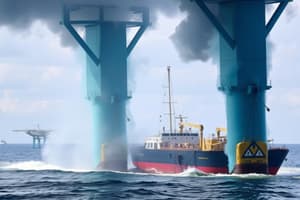Podcast
Questions and Answers
What primarily forms the basis for the shipping safety regime?
What primarily forms the basis for the shipping safety regime?
- Additional requirements set by national maritime administrations
- Common international standards established by consensus
- International safety codes and regulations issued by the IMO (correct)
- Accident experience providing motivation for improved regulation
How do IMO regulations go into effect?
How do IMO regulations go into effect?
- After enough maritime states have ratified them (correct)
- After approval from the United Nations Security Council
- When a single maritime state enacts them in its domestic legislation
- Once a majority of maritime states have shown interest
Why has the reactive approach to marine safety regulations been less effective for unusual and rapidly changing designs?
Why has the reactive approach to marine safety regulations been less effective for unusual and rapidly changing designs?
- It relied on national maritime administrations
- It focused on international safety codes and regulations
- It was based on accident experience (correct)
- It was successful for large fleets of similar ships
What is the main responsibility of ratifying states with regard to IMO regulations?
What is the main responsibility of ratifying states with regard to IMO regulations?
What is the primary method through which the IMO works to establish common international standards?
What is the primary method through which the IMO works to establish common international standards?
What is the primary goal of FSA in the maritime industry?
What is the primary goal of FSA in the maritime industry?
How does FSA contribute to decision-making processes in the maritime industry?
How does FSA contribute to decision-making processes in the maritime industry?
What is a key advantage of applying FSA to regulatory measures in the maritime industry?
What is a key advantage of applying FSA to regulatory measures in the maritime industry?
Why is FSA particularly relevant to proposals with far-reaching implications in the maritime industry?
Why is FSA particularly relevant to proposals with far-reaching implications in the maritime industry?
What does FSA enable in terms of potential hazards in the maritime industry?
What does FSA enable in terms of potential hazards in the maritime industry?
Flashcards are hidden until you start studying
Study Notes
International Maritime Organization (IMO) Regulations
- The IMO's shipping safety regime is primarily based on international conventions and protocols adopted by IMO member states.
Implementation of IMO Regulations
- IMO regulations come into effect once a predetermined number of countries ratify them, which is usually a minimum of 30 states.
Limitations of Reactive Approach
- The reactive approach to marine safety regulations has been less effective for unusual and rapidly changing designs because it focuses on responding to past incidents rather than proactively addressing emerging risks.
Responsibility of Ratifying States
- The main responsibility of ratifying states is to implement and enforce IMO regulations domestically, ensuring that their national laws and regulations align with international standards.
International Standardization
- The primary method through which the IMO works to establish common international standards is by adopting and implementing a set of mandatory and recommendatory measures.
Formal Safety Assessment (FSA)
Primary Goal
- The primary goal of FSA in the maritime industry is to provide a systematic and structured approach to evaluating the risks associated with a particular regulation or proposal.
Contribution to Decision-Making
- FSA contributes to decision-making processes in the maritime industry by providing a comprehensive and objective assessment of the risks and benefits associated with different regulatory options.
Key Advantage
- A key advantage of applying FSA to regulatory measures in the maritime industry is that it enables a more informed and transparent decision-making process.
Relevance to Proposals with Far-Reaching Implications
- FSA is particularly relevant to proposals with far-reaching implications in the maritime industry because it provides a thorough and structured analysis of the potential risks and benefits associated with such proposals.
Hazard Identification
- FSA enables the identification of potential hazards in the maritime industry, allowing for proactive measures to be taken to mitigate or eliminate these risks.
Studying That Suits You
Use AI to generate personalized quizzes and flashcards to suit your learning preferences.




